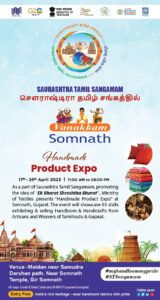CHENNAI, APR 19
The Ministry of Textiles has organised an exhibition of handloom and handicraft at Somnath and Dwarka, showcasing the exquisite range of handloom and handicraft from the States of Tamil Nadu and Gujarat.
𝐂𝐇𝐀𝐏𝐓𝐄𝐑 𝟑: 𝗘𝗸 𝗕𝗵𝗮𝗿𝗮𝘁 𝗦𝗵𝗿𝗲𝘀𝘁𝗵𝗮 𝗕𝗵𝗮𝗿𝗮𝘁 𝗶𝗻𝗶𝘁𝗶𝗮𝘁𝗶𝘃𝗲 𝗯𝘆 𝗣𝗠 𝗠𝗼𝗱𝗶 𝘁𝗵𝗿𝗼𝘂𝗴𝗵 𝗞𝗮𝘀𝗵𝗶 & 𝗦𝗮𝘂𝗿𝗮𝘀𝗵𝘁𝗿𝗮 𝗧𝗮𝗺𝗶𝗹 𝗦𝗮𝗻𝗴𝗮𝗺𝗮𝗺
2006 when the relation between Saurashtra and Tamilnadu has been enlightened.
2022 when… pic.twitter.com/ukWxnK6mWH
— STSangamam (@STSangamam) April 19, 2023
- Ministry of Textile to organise Chintan Shivir with industry stakeholders on April 21-22 in Rajkot
- Sungudi cotton woven by Saurashtrian Tamils best summer wear and it has received geographic identity (GI) card from the Union government on January 1, 2005.
- Dwarka-Madurai Special train to leave Dwarka at 10:40 pm on Wednesday and will reach Madurai at 10:30 am on Saturday
The Ministry is also organizing a Chintan Shivir with Textile Industry stakeholders on Friday and Saturday, 21-22 April 2023 in Rajkot, to discuss and deliberate upon various important agendas and topical issues pertaining to the textile industry.


The activities are a part of “Saurashtra Tamil Sangamam”.
The ‘Saurashtra Tamil Sangamam’ is organized in close coordination between Central and State Government of Gujarat, supported by various institutions and ministries, including the Ministry of Textiles.
Cabinet Ministers of Gujarat Shri @Mulubhai_Bera & Shri @kuberdindor exploring exhibition stalls at #STSangamam Event Centre. pic.twitter.com/oV18qqO7m5
— STSangamam (@STSangamam) April 19, 2023
The Chintan Shivir program spread over 2 days shall include 2 expert discussions on (a) exploring opportunities for India in Technical Textile with focus on Home-Tech and Cloth-Tech products and (b) Roadmap for Sustainability & Circularity on 21st April 2023. Textile Advisory Group (TAG) meetings on cotton and man-made fibres are planned to take place in the afternoon of 22nd April 2023, followed up with Soft Launch of e-commerce portal of Handloom & Handicraft products.
Sungudi cotton saris woven by Saurashtrian Tamils best summer wear
With the advent of summer, Sungudi cotton saris woven by Saurashtrian Tamils is the best summer wear for women. It is a geographical indicator of Madurai in the world of Indian textiles. The cloth is soft; the dyes are bright and the dots distinct, thus enticing several takers. Despite the onslaught of powerloom woven sarres, handwoven saris are particularly in demand. The traditional dots are largely preferred, though it costs time, effort and money. The hand-painted wax-resistant designs and motifs are more in demand.
Rollback GST on Sungudi saris: Madurai MP
Met in person and handed over a letter demanding that the hike in GST tax from 5 to 12 pc for textiles including Madurai’s iconic Sungudi sarees be put on hold.
It has now been put on hold. Many thanks to @GST_Council & @nsitharaman! #GST #Textile #Handloom pic.twitter.com/ynU2DyW5Nb— Su Venkatesan MP (@SuVe4Madurai) December 31, 2021
It is pertinent to note that Madurai MP Su Venkatesan had requested Union Finance Minister, Nirmala Sitharaman to withdraw the 12 per cent GST on Sungudi sarees that are traditionally worn by women of the lower strata of the society. In a statement, the CPI-M MP said that he met the minister in person at her office in New Delhi and told her that the popular and unique Sungudi sarees were crafted by the minority Saurashtrian community in Madurai, were handmade and machines are not used at any stage on this. He said that increasing the GST from 5 per cent to 12 per cent would crush the industry and render thousands jobless.
He said that the Tamil Nadu government had earlier exempted sales tax on Sungundi sarees in 1955 itself and added that these had received the geographic identity (GI) card from the Union government on January 1, 2005. He said that in 2017, the Centre levied 5 per cent GST on Sungundi sarees that pushed the poor weaving community into poverty and increasing this GST to 12 per cent would lead to an end to the sarees’ production.
A population of around 13 lakh Saurashtrian people currently settled in 47 cities/ towns of Tamil Nadu trace their origins to the Gujarat State. The historical accounts mention that the Saurashtrian people, highly adept in variety of tasks in addition to weaving,migrated to Madurai and other cities of the State in large numbers some 400 years ago, owing to upheavals caused by external invasions.
The objective of Saurashtra Tamil Sangamam (STS) organized through various programmes at Somnath, Dwarka and Statue of Unity (Gujarat), during the month of April 2023, is to promote age-old ties and cultural linkages between Saurashtra and Tamil Nadu. The STS is another important milestone event added to the series of events conducted under the Government of India’s ‘Ek Bharat Shreshtha Bharat’ (EBSB) initiative.
The EBSB initiative, guided by the vision of Prime Minister of India Narendra Modi, aims to enhance interaction & promote mutual understanding between people of different States/UTs through the concept of State/UTs pairing. The paired States/UTs carry out engagements with one another in multiple spheres including language, literature, cuisine, festivals, cultural events, tourism, among others.
The Saurashtra Tamil Sangamam is in perfect continuity to the Kashi Tamil Samgamam that took place last year at Varanasi, wherein our Prime Minister Narendra Modi, reiterated that “Our resolutions in ‘Amrit Kaal’ will be fulfilled by the unity and collective efforts of the whole country” and emphasised on furthering the positive outcomes brought by Kashi Tamil Sangam.
The ‘Saurashtra Tamil Sangamam’ initiative aims to promote the rich cultural heritage of the Saurashtra community living in Tamil Nadu. It will provide a platform for Saurashtrians in Tamil Nadu to connect with their brethren in Gujarat and celebrate their shared traditions and values.












